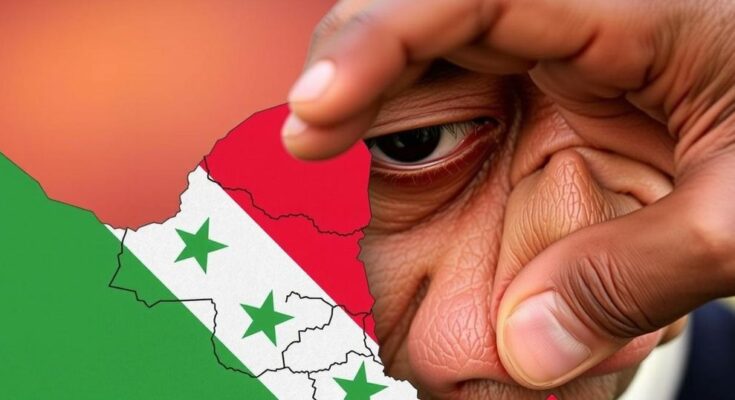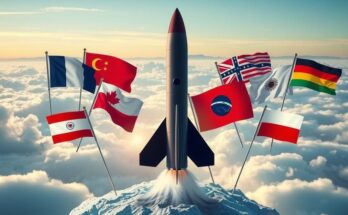The ongoing conflict in Sudan may lead to a de facto partition, separating Darfur from the rest of the country as the RSF consolidates its power in the region. Analysts warn that this split could spark further chaos and lead to increased difficulty in establishing peace. The Sudanese Army’s recent territorial gains highlight the complexities of military strategy and alliances in this fractured landscape, driving the potential for state disintegration.
Sudan is on the brink of being de facto partitioned, predominantly separating Darfur from the rest of the country, as ongoing conflicts between the Sudanese Army and the paramilitary Rapid Support Forces (RSF) persist. Following nearly two years of intense fighting, the RSF has established firm control over the western region of Darfur, which is approximately the size of France. As the Sudanese Army makes gains in other areas, this bifurcation could deepen, potentially leading to an even more fragmented state.
Analysts express that such a division may exacerbate localized conflicts and could escalate the collapse of national structures. Kholood Khair, an expert on Sudanese political affairs, stated, “A split would be the beginning of the end for Sudan.” While the conflict initially resulted in mass casualties and displacements, its continuation raises concerns over lasting peace agreements and state stability. If the partition solidifies, the tenuous coalitions linked to both military factions could become even more problematic in achieving resolutions to the ongoing crisis.
The Sudanese Army has recently regained control of Wad Madani, a critical city that the RSF had dominated for over a year. Reports indicate severe human rights abuses committed by the RSF in this city, bringing further scrutiny to its operations. The RSF’s inability to maintain its hold on Wad Madani has caused speculation about its capacity to consolidate power in other areas, particularly as it increasingly struggles to recruit outside its traditional stronghold in Darfur.
Strategic control over various parts of Darfur and its resources remains increasingly vital, especially as the RSF looks to strengthen its position amid the chaos. Historically, Darfur has been a rich agricultural region with significant borders facilitating potential resource access from neighboring countries. Hence, analysts predict that both factions might find a split advantageous, as it allows each to claim military successes without compromising their hold on the regions under their control.
The influx of foreign support for the Sudanese Army has revitalized its operations, with countries like Iran, Turkey, and Egypt providing military aid since the onset of the conflict. Despite prior vulnerabilities, experts state that the army, bolstered by external assistance, has improved its logistical capabilities and military strength compared to last year. However, the dynamics of the situation imply that while there may be pressure for the army to regain territories, it might simultaneously have to sacrifice alliances with local groups seeking their own positions of power within this fracturing landscape.
The consequences could see an eventual abandonment of tribal alliances, while resistance in Darfur could intensify. Moreover, triggers for intra-group conflicts and rivalries are likely as various factions compete for their respective interests under the current strife. As both army and RSF rely on affiliated militias, the potential for chaos looms, raising concerns about the future stability of Sudan amid growing infighting and territorial disputes. “Each [of the army’s militias] will demand to share wealth and power in any post-conflict situation,” warns Suliman Baldo, capturing the essence of the complexities involved.
Sudan has faced severe instability since the outbreak of conflict in April 2023, particularly between the Sudanese Army and the Rapid Support Forces (RSF), the latter being developed from former pro-government militias associated with the decades-long conflict in Darfur. The lengthy civil strife has resulted in devastating humanitarian consequences, including extensive casualties and widespread displacement. The international community’s involvement has further complicated local dynamics, fueling ongoing confrontations and struggles for control within the region. The potential for partition reflects a dire prognosis for Sudan’s future stability and governance.
The possible partition of Sudan symbolizes a turning point that could lead to profound disintegration and localized strife, emphasizing the fragility of state sovereignty in the face of prolonged conflict between rival factions. With the RSF entrenched in Darfur and the army regaining ground elsewhere, the risk of an entrenched divide demands urgent attention. The complex interplay of local and international dynamics, alongside internal tribal rivalries, suggests that any semblance of peace remains precarious and could further complicate the possibilities for national recovery or reconciliation.
Original Source: www.aljazeera.com




